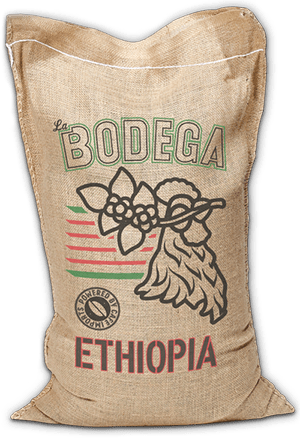Ethiopia – Natural Yirgacheffe – Grade 3 – Abaya B20925
Specs:

Source:
Ethiopia
Region:
Yirgacheffe
Farm:
Abaya
Variety:
Heirloom Ethiopian Varieties
Altitude:
1800-2100 MASL
Processing:
Natural
Notes:
"Perfumey jasmine with mellow potpourri-like lavender, fresh stone fruit, and amaretto flavors. Tart citric acidity and mild delicate fruit-like sweetness."
Score:
Price/Bag:
$5.52 per lb
$243.00 per bagOut of stock
Background:
Abaya
This coffee comes from the Gelana Abaya washing station near the kebele (village) of Asgori located in the woreda (district) of Abaya.
Gelana Abaya
Local tribe: Tore
Language: Omoromic
Number of producers: 9000–10,000
Annual Production: 100+ containers
Average farm size: 3.5 hectares
Number of mills in the area: 5
Processing: Coffee is covered during the hottest part of the day. Lots of fresh compost used in this area. Composting takes three months
Gelana Abaya is another gem of a region in Yirgacheffe region. This area is nestled between Lake Abaya on the west and the town of Yirgacheffe on the East.
Coffees in Ethiopia are typically grown on very small plots of land by farmers who also grow other crops. The majority of smallholders will deliver their coffee in cherry to a nearby washing station or central processing unit, where their coffee will be sorted, weighed, and paid for or given a receipt. Coffee is then processed, usually washed or natural, by the washing station and dried on raised beds.
The washing stations serve as many as several hundred to sometimes a thousand or more producers, who deliver cherry throughout the harvest season: The blending of these cherries into day lots makes it virtually impossible under normal circumstances to know precisely whose coffee winds up in which bags on what day, making traceability to the producer difficult. We do, however, make every available effort to source coffee from the same washing stations every year, through our export partners and their connections with mills and washing stations.
Typically farmers in this region don't have access to and therefore do not utilize fertilizers or pesticides in the production of coffee.
Recommendations
-

Bolivia – FTO La Paz – La Cooperativa Corpus Cristhy Illampu R.L – Red Catuai & Typica – FLO ID 3645
$ 5.14 per lb Add to cart -

Brazil – Organic Cascara – Cascara Tea – Espirito Santo – Fazenda Camocim – Biodynamic
$ 15.87 per lb Add to cart -

Burundi – Microlot – Gakenke – Kayanza – Washed
$ 6.05 per lb Add to cart -

Colombia – Decaf Origin Select – EA Decaf de Cana – Huila
$ 5.27 per lb Add to cart
